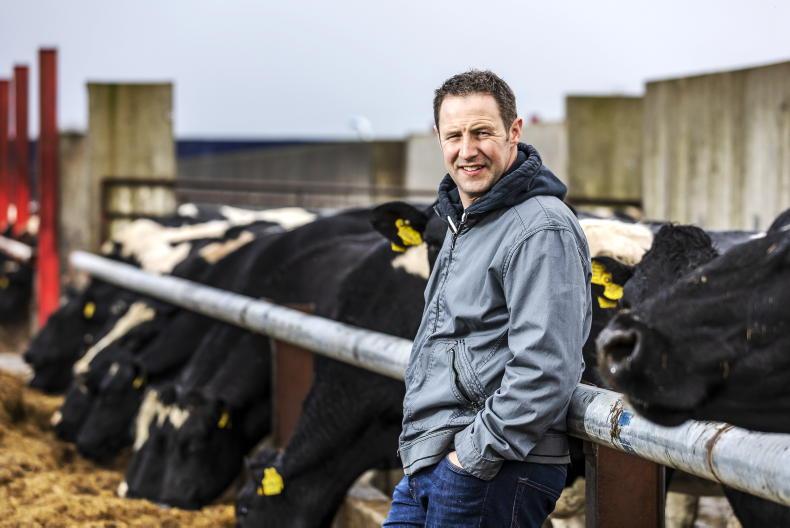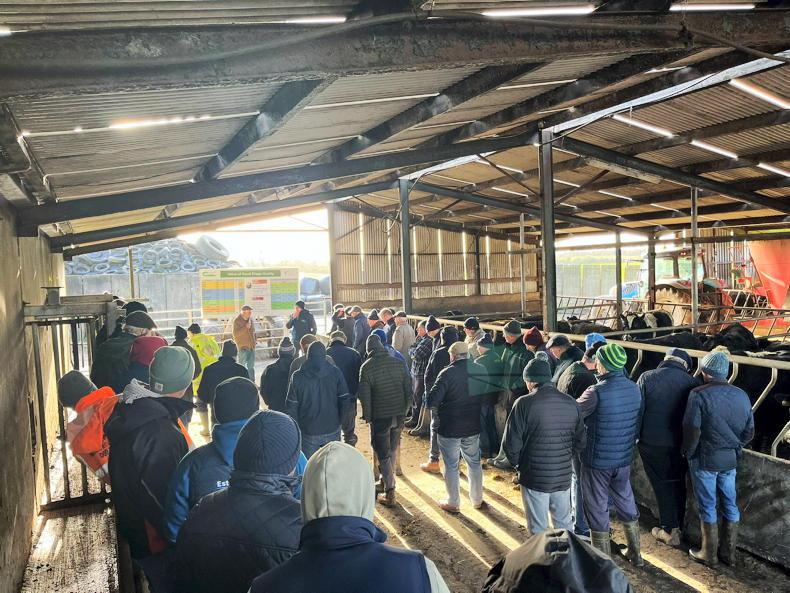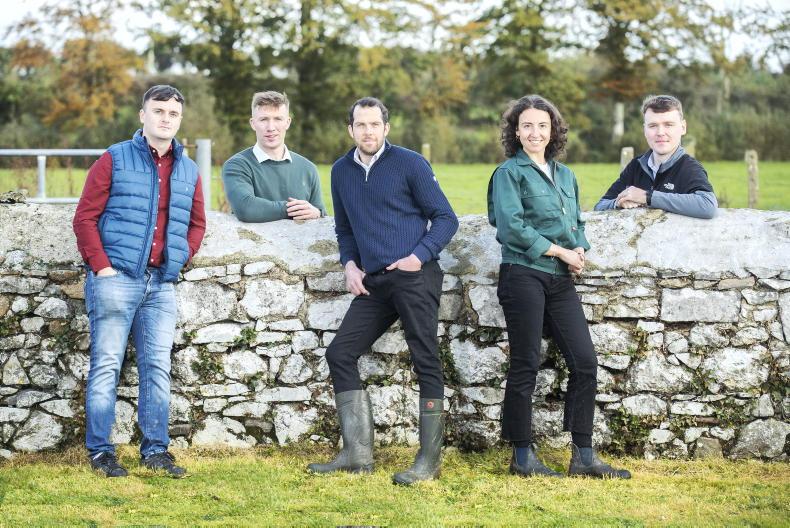Dung beetles are “parasite enemy number one” and offer huge potential for reducing anthelmintic resistance in Irish livestock production, according to Nuffield 2020 scholar Bruce Thompson.
A healthy population of dung beetles reduces parasite loading and in turn “reduces the need for worming”, he said.
The Kilkenny mixed farmer presented his Nuffield scholar 2020 report Can anthelmintic resistance mitigation measures benefit the environment through the deployment of grazing strategies and dung beetles? at the Nuffield Ireland Conference 2021on Friday.
Anthelmintic resistance
Defining anthelmintic resistance and outlining the basis of his research report, Thompson said: “Every time we worm our animals, a small number of parasites remain unscathed and over time, this resistance builds up.”
On his own farm, he realised the parasite control programme of regular dosing was “heading in the wrong direction” and leading to growing anthelmintic resistance.
He said this issue, which affects the productivity of livestock, is “a sleeping giant that is just awakening” on many Irish farms.
Comparison
During his research, Thompson set out to learn the best practice in removing parasites from agricultural pasture by comparing approaches internationally.
In Tasmania, he studied the system of using older livestock to “hoover up parasites” off pasture to make such fields suitable for grazing by “more susceptible younger animals”.
He engaged with scientists at the University of Bristol, who have created a “30% reduction of infection stage larvae herbage in field conditions”.

Dung beetles offer huge potential in reducing anthelmintic resistance on Irish farms. \ Dung Beetles for Farmers
In Australia, he followed a project that imports and disperses dung beetles across the continent and witnessed the benefits of soil aeration and parasite control.
It was this evidence, coupled with trials observed in Tasmania, where the use of dung beetles had led to pastures where “dung patches disappeared”, that led him to research the potential for dung beetles in Irish agricultural production.
Field trials
Supported by Nuffield Ireland, Thompson conducted field fields trials on rearing dung beetles in Kilkenny.
These trials involved keeping the beetles in confined pasture areas to “create competition” which “encourages breeding activity”.
He described how Ireland has an advantage, in that unlike Australia, dung beetles are already present here, but “we’ve been depleting the population [through modern farming techniques] and we just need to reverse this trend”.
He said Irish dung beetles will propagate themselves if farmers can create the right conditions.
“Our dung pats are currently like a retirement home and we need to turn them into Glastonbury,” he said.

Bruce Thompson farms in Ballyfinn, Co Laois.
Potential
Thompson presented the possibilities for the rollout of his dung beetle programme nationally.
Along with other interested farmers, vets and ecologists, he has launched an information website, to “inform people who could be more dung beetle friendly”.
He said: “The biggest fear farmers have is seeing a diseased animal with a heavy parasite burden.
“Farmers and vets must come together to use as much dosing as necessary, but as little as possible.”
He encouraged farmers to “go home and look at their [dung] pats” and consider the role of dung beetles in breaking these down and removing the land’s parasite burden.
“It’s about showing farmers the process we can go through to prevent anthelmintic resistance.”
Thompson said it can not only improve animal health and benefit farm biodiversity, but can also save money.
Dung beetles are “parasite enemy number one” and offer huge potential for reducing anthelmintic resistance in Irish livestock production, according to Nuffield 2020 scholar Bruce Thompson.
A healthy population of dung beetles reduces parasite loading and in turn “reduces the need for worming”, he said.
The Kilkenny mixed farmer presented his Nuffield scholar 2020 report Can anthelmintic resistance mitigation measures benefit the environment through the deployment of grazing strategies and dung beetles? at the Nuffield Ireland Conference 2021on Friday.
Anthelmintic resistance
Defining anthelmintic resistance and outlining the basis of his research report, Thompson said: “Every time we worm our animals, a small number of parasites remain unscathed and over time, this resistance builds up.”
On his own farm, he realised the parasite control programme of regular dosing was “heading in the wrong direction” and leading to growing anthelmintic resistance.
He said this issue, which affects the productivity of livestock, is “a sleeping giant that is just awakening” on many Irish farms.
Comparison
During his research, Thompson set out to learn the best practice in removing parasites from agricultural pasture by comparing approaches internationally.
In Tasmania, he studied the system of using older livestock to “hoover up parasites” off pasture to make such fields suitable for grazing by “more susceptible younger animals”.
He engaged with scientists at the University of Bristol, who have created a “30% reduction of infection stage larvae herbage in field conditions”.

Dung beetles offer huge potential in reducing anthelmintic resistance on Irish farms. \ Dung Beetles for Farmers
In Australia, he followed a project that imports and disperses dung beetles across the continent and witnessed the benefits of soil aeration and parasite control.
It was this evidence, coupled with trials observed in Tasmania, where the use of dung beetles had led to pastures where “dung patches disappeared”, that led him to research the potential for dung beetles in Irish agricultural production.
Field trials
Supported by Nuffield Ireland, Thompson conducted field fields trials on rearing dung beetles in Kilkenny.
These trials involved keeping the beetles in confined pasture areas to “create competition” which “encourages breeding activity”.
He described how Ireland has an advantage, in that unlike Australia, dung beetles are already present here, but “we’ve been depleting the population [through modern farming techniques] and we just need to reverse this trend”.
He said Irish dung beetles will propagate themselves if farmers can create the right conditions.
“Our dung pats are currently like a retirement home and we need to turn them into Glastonbury,” he said.

Bruce Thompson farms in Ballyfinn, Co Laois.
Potential
Thompson presented the possibilities for the rollout of his dung beetle programme nationally.
Along with other interested farmers, vets and ecologists, he has launched an information website, to “inform people who could be more dung beetle friendly”.
He said: “The biggest fear farmers have is seeing a diseased animal with a heavy parasite burden.
“Farmers and vets must come together to use as much dosing as necessary, but as little as possible.”
He encouraged farmers to “go home and look at their [dung] pats” and consider the role of dung beetles in breaking these down and removing the land’s parasite burden.
“It’s about showing farmers the process we can go through to prevent anthelmintic resistance.”
Thompson said it can not only improve animal health and benefit farm biodiversity, but can also save money.












SHARING OPTIONS